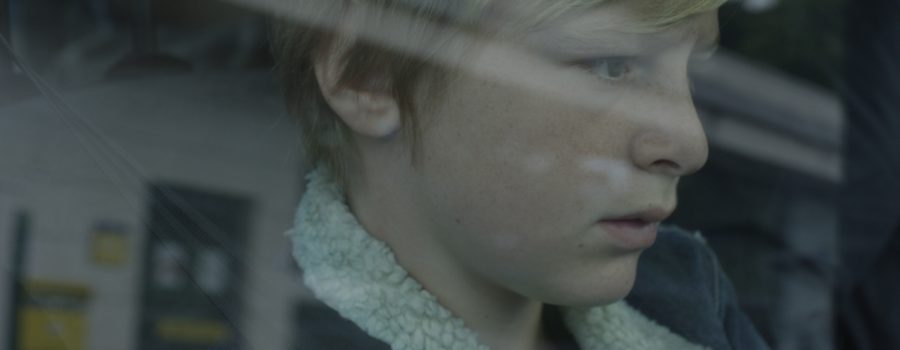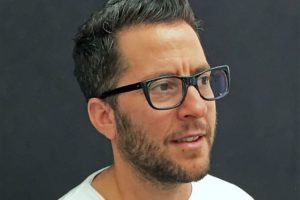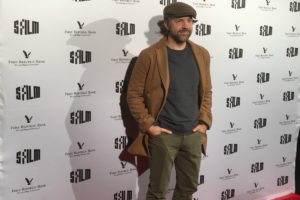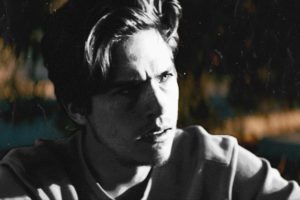[Published at The Playlist] Filmmaker Xavier Legrand began his career as an actor. A graduate of the prestigious Conservatoire National Supérieur d’Art Dramatique of Paris, Legrand has acted onstage since the age of ten. Legrand’s impressive career as a filmmaker has taken a decidedly different route. The actor, writer, and director dove headfirst into the medium of directing with his 2013 Oscar-nominated short film, “Just Before Losing Everything” (“Avant que de tout perdre”), learning as much as he could about the craft, hands-on. Recently, Legrand completed his first feature film, “Custody” (“Jusqu’à la garde”), based off of his short film, for which he won the coveted Silver Lion (Best Director) award at the Venice Film Festival.
In “Custody,” divorced parents Miriam (Léa Drucker) and Antoine Besson (Denis Ménochet) are in the middle of a custody battle, in which Miriam is seeking sole custody of their son Julien (Thomas Gioria) in order to protect him from Antoine, who she claims is violent. Antoine pleads his case as a shunned dad whose feelings are hurt by Miriam’s rejection, and he wins joint custody. Julien, a victim trapped in between Antoine’s war of the wilted roses, is pushed to his limits in order to save himself and his family.
On the cusp of the U.S. theatrical release (June 29, 2018) of “Custody,” I had a chance to catch up with Legrand and discuss his new film and its themes, his acting and filmmaking careers, and more.
What was your inspiration behind the story of “Jusqu’à la garde” and the short upon which it’s based, “Avant que de tout perdre?”
First of all, it was a desire to write about family, about the home, but also to rediscover the themes of classic tragedies: blood ties, revenge, honor killings – the choice between the heart or reason and madness in our contemporary world.
I was interested in violence in the family, and more particularly domestic violence. From the moment I decided to write about this painful subject, I did a lot of research to understand the phenomenon from a psychological, social and political point of view.
For a first time filmmaker, an Oscar nomination and a Silver Lion is impressive. Before making the leap from acting into directing, did you anticipate a potential future like this where you would receive such critical acclaim for your work? Has it helped build your confidence as a filmmaker?
I’m a theatre actor. I’ve been playing on stage since I was about ten years old and I’ve devoted all my studies to training as an actor. I haven’t done any cinematic studies or training. I never expected my first two films to be so successful – it’s absolutely amazing. It’s true that receiving so many awards from professional juries who notice your film gives you confidence.
I admit that when I made “Custody,” I still had trouble seeing myself as a real director. But the Silver Lion for best director I received from the Jury at Venice, presided over by Annette Bening, caused me such emotion that I began to accept this idea: I am a legitimate director.
Bit by bit, small details of the plot are unveiled, building tension at an escalating pace. How did you decide Miriam and Antoine’s respective motivations and how far Antoine was willing to take his war of the wilted roses?
I based this on a large number of family situations described in newspapers, on the facts in testimonies I read, and on the people I met who told me their stories.
I have noticed that in the majority of these cases, the moment of separation is a dangerous, tense moment that sometimes leads to tragic outcomes.
I quickly understood that it is this moment of separation for a couple, especially when there are children involved, that was the moment an important social, societal, political, and psychological debate could be put on the table: “Can a violent spouse be a good parent?” It is from this moral debate that I conceived the objectives and motivations of each of the characters.
Antoine is a man who has chosen violence and who is pro-patriarchal; in the sense that he considers that his wife belongs to him and that his children are his property. He feels he can act and demand what he wants from them. He put the ring on this woman’s finger, she bears his name, she carried his children, so it is unbearable that she could go and live elsewhere without him. In France, a woman is murdered by her spouse or ex-spouse every 2 or 3 days. In 90% of cases, it is at the time of separation or just after that these murders occur. Antoine is one of those men who act in France and all over the world. What’s chilling is that many men today still think this way – “We are married until death do us part. Only death will separate us – it is not you who has the control to separate us. I’d rather know you were dead than alive without me.” There’s nothing romantic about this way of loving.
There’s an obvious theme of using children as unwitting weapons in toxic or failed relationships. You often allude to past trauma and foreshadow by focusing on the perturbed or petrified expression on Julien’s face. Was this something you wrote in the script or added in later in the filmmaking process?
Yes, from the beginning it was important not to show the family’s past. In looking at domestic violence and its impact on children, it seemed more important to me to show how difficult it is to get out of it, rather to show how it has been committed for many years.
The theme of toxic masculinity is present through the character of Antoine. He is somebody who doesn’t learn from his mistakes. Whereas, contrarily, through Miriam, themes of abuse, being a survivor, strength, and independence emerge. With their expert performances, Léa Drucker and Denis Ménochet personify these themes. Can you speak a bit about what it was like working with them?
Domestic violence is hidden violence. We did a lot of work on the subject with the actors and I led them to get completely into the skin of domestic violence so that they understand the mechanisms, but above all so that they avoid certain clichés that we may have about this theme. The most important thing was that they understood to what extent both the perpetrator and the victim are in denial of the violence. That is why my main guideline was that Denis should play the victim and Léa the guilty one. This is the paradox of this kind of situation: violent men feel themselves victims to justify their violence, and women victims of this violence feel guilt, shame, while trying to keep their dignity.
I’m a big fan of music in film and musical numbers in film. Mathilde Auneveux’s cover of “Proud Mary” was one of my favorite sequences in the film. There is so much going on underneath the surface. Can you walk me through the song choice of and peel back some of the layers behind that scene?
The choice of the song “Proud Mary” has several meanings. It’s a song that was covered by Ike and Tina Turner. Everyone knows, Tina Turner is a survivor. But also because the structure of the song is built on a slow and calm start, finishing faster or even roughly, just like the structure of the film. It is also a song about freedom and solidarity. Joséphine, when she sings this song in front of her whole family, is concerned about what is happening outside the village hall. Yet it is also a farewell that she is singing to them, without knowing it. As in the song, she will flee a kind of bondage to build her own life with the one she loves.
Amazingly, “Jusqu’à la garde” doesn’t feature a score, aside from the “Proud Mary” cover, making it all the more impressive that you were able to make such an effective thriller in your finished product. Can you explain the decision to not feature music in your film?
This principle was already decided at the beginning of the project. In my short film “Just Before Losing Everything“, I used the same process. The idea came from the beginning the writing process: I had gathered many testimonies. The stories of these women were real thrillers, but daily thrillers. One of them told me that at night, when she was home and her husband came home from work, she knew if she was going to be beaten the way he put the key in the lock and opened the door. I understood that no music would help convey and translate this sound terrorism. So the music of the film would be the sounds of everyday life.
“Jusqu’à la garde” has been compared to Hitchcock, Chabrol, and Mungiu in its ability to keep the audience on the edge of its seat. You play a lot with perspective, closeups, ambiguous lighting and a tight story to keep the tension rising. Who are some of your cinematic influences?
Indeed, Hitchcock and Chabrol are directors I love and who have influenced my work. Michael Haneke is a filmmaker who also played an important role in writing and designing this project. “The Night of the Hunter” with Charles Laughton or “The Shining” of Stanley Kubrick were also influences for “Custody”
The suspense never stops strengthening until the final scene. Did you always anticipate that Miriam, Antoine, and Julien’s story would end on such a loud note?
Of course, it was important for me to reflect a reality, without making concessions. The transformation of the genre during the film was present from the beginning of the writing. I wanted to go from a social drama to a horror movie via the thriller. It was interesting to flesh out the story’s arc. Some court decisions can lead families into terrifying situations, so the question was how to move from the first image of the film (which is in the office of a family court judge) to the last image that is in a bathtub.
You started acting long before you began filmmaking, for which you’ve received wide acclaim. After the Oscar nomination and the Silver Lion at Venice, do you consider yourself more of an actor or a filmmaker?
I still consider myself an actor, since that’s what I’ve been doing for many years now. But today, I don’t want to choose. I want to continue acting in, writing and directing films.
What is your educational background as a filmmaker and actor? Is it formal or more hands-on?
I studied acting at one of the most important national drama schools (Conservatoire National Supérieur d’Art Dramatique of Paris). But I didn’t have any film training. I really learned on the job, more hands-on.
Are there any exciting new projects that you are currently working on?
I just played a French Secret Service Spy in the first feature film of a French director. I am also writing my second feature film. And I’m going to do a stage play next year.








Leave a Reply
Your email is safe with us.